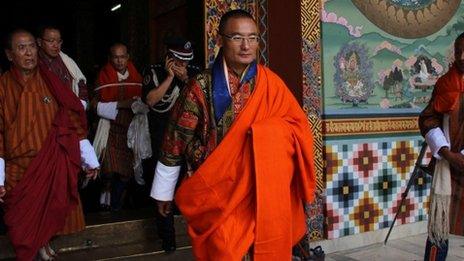The turbulent life story of Bhutan's happiness guru
- Published
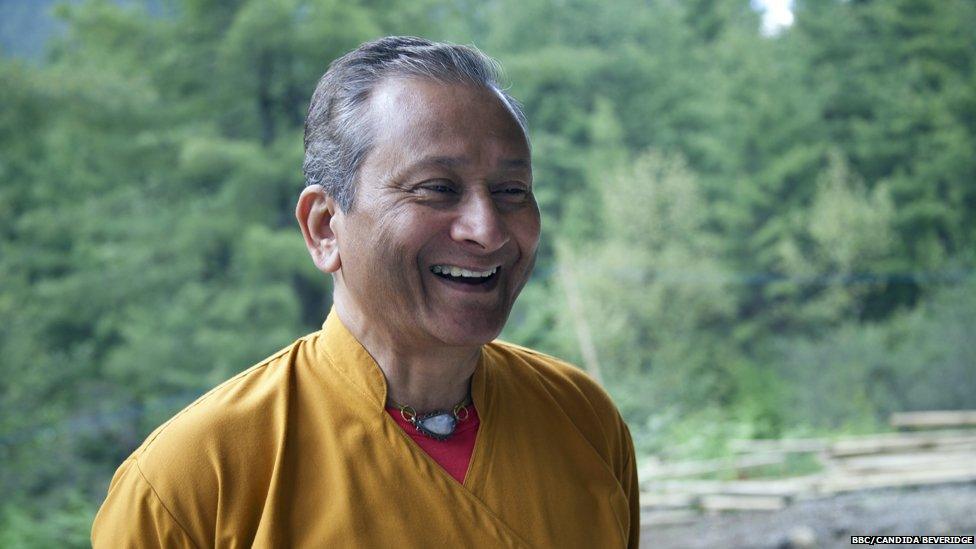
In the 1970s, the king of Bhutan announced that the happiness of the population was more important than Gross Domestic Product. Saamdu Chetri has been charged with overseeing Bhutan's happiness - but his own life has had its share of suffering.
On the banks of a river in the remote Bumthang valley in the foothills of the Himalayas, Bhutan's first happiness centre is under construction. Among the workers breaking stones is Saamdu Chetri, dressed in monks' robes, wielding a pickaxe.
At first the workers were puzzled at his hands-on involvement, he says. "Then they realised it's not just for them, I'm helping myself by being physically fit."
Chetri chose this remote location because of its spiritual history and its beauty. "It's one of the most beautiful valleys in the country," he says. "This is a place of happiness for me where I find so much relation with nature - the place itself is so serene."
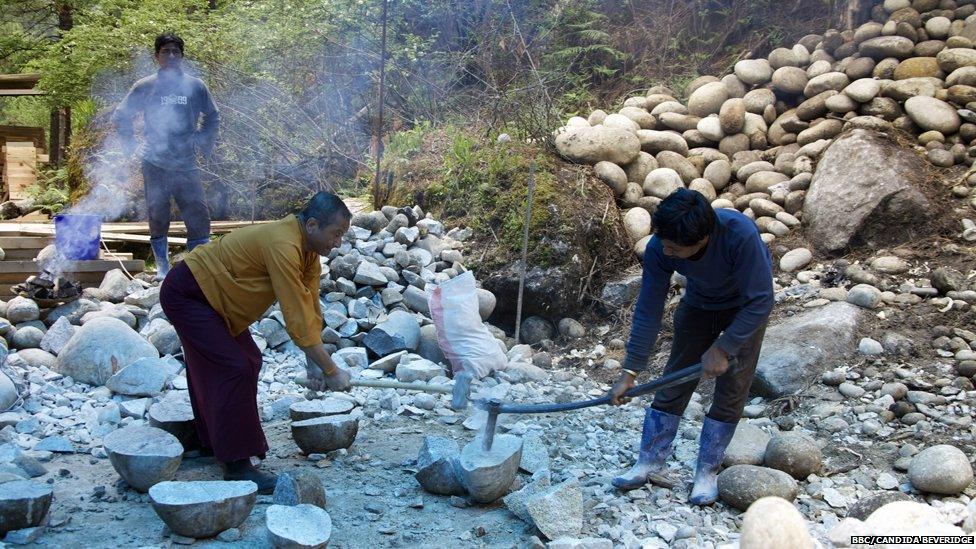
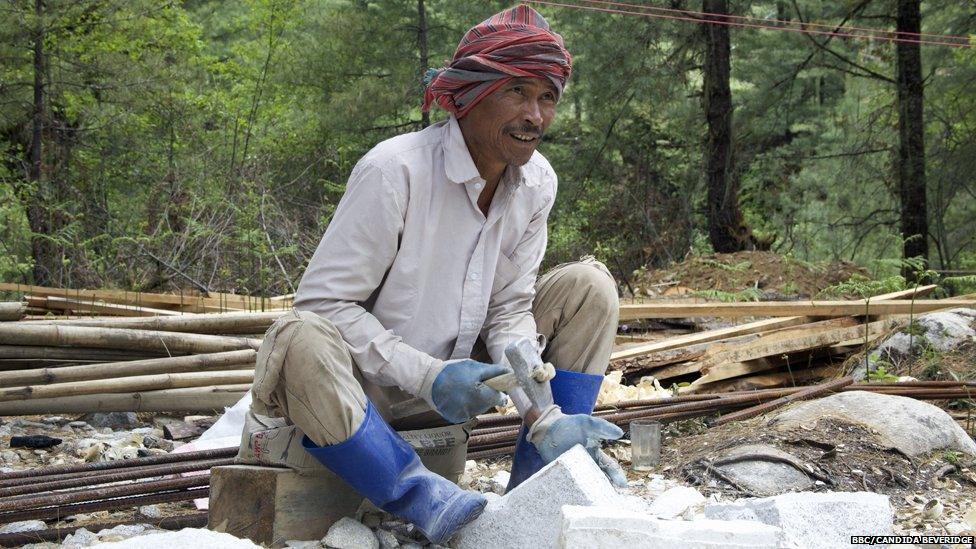
For a man charged with bringing happiness to a nation, Chetri has suffered much in his life and comes from the most humble beginnings.
"I was born in a cowshed," he says. "I was so attached to animals, plants - anything to do with nature.
"My parents never thought about schooling. We had seven brothers and four sisters, they were all working and I thought I would also be one of the working persons."
To his surprise, when he was nine years old his brother took him to school - something that worried his father a great deal.
"I was the most loved child and they didn't want me to leave the house," Chetri says.
"My father was very worried that I would become weak, so he sent a cow with me to school." He laughs at the memory.
"Of course the cow couldn't stay long because it had to be fed and looked after, so he took back the cow and he started visiting me with a lot of butter, cheese and milk."
He left school at the age of 14 because his brothers and sisters had left home and he felt a duty to help his parents. His day on the farm began at 04:00 when he would walk a kilometre to fetch water, after which he would feed the ox and begin to plough.
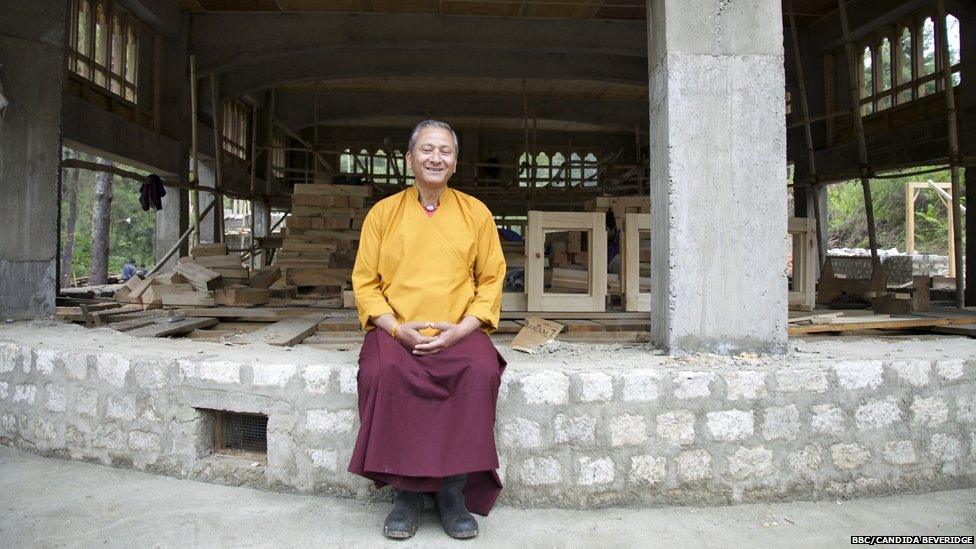

Find out more
Saamdu Chetri spoke to Outlook on the BBC World Service

He decided to carry on his education, but his life changed dramatically when his parents took him on a pilgrimage to Nepal. There, they befriended another family who had their eyes on Chetri as a potential son-in-law.
He was only 15 at the time and knew nothing about it. Their intentions only became clear when one of the men from the Nepalese family invited them all to a family wedding.
"The man took me to town, then they started measuring my finger - I said, 'What are you doing with my finger?'" The man explained that he was only trying the ring on because he was the same size as a boy who was going to get married the next day - the same happened with the wedding outfit.
The following day the wedding ceremony began. Two ceremonial places were built, and Chetri and another boy were placed next to two empty chairs. "Then suddenly there are two men carrying two girls on their backs, coming towards us. One girl sat beside that boy, the other girl sat beside me. I tried getting up and they pushed me down on the chair," says Chetri.
"Then my mum came and said, 'Sorry son, you have been duped.'
"I felt I was dead - I wanted to die that moment. I was not only angry, I was so hurt. I couldn't do anything."
Once the ceremony began, it was too late to escape. The couple were given a small hut to retire to, but Chetri was too upset to sleep.
"I wanted to jump into the well and die, because this was something that I never expected my parents to do," he says.
Chetri was climbing up to the well to carry out his plan when his wife's father caught him from behind, and broke into bitter tears. "Please don't blame your parents, it's me who has cheated everybody, because I found you would be a great husband for my daughter," the father said.
Tradition
He begged Chetri to think of his young bride. "If you die now, the repercussion that will happen on this little girl is that she will be widowed and nobody will marry her after that."
Chetri and his wife had children, and she lived at home with her parents while he continued his education at college in India. However, traumatised by events in her own life, one day she disappeared, leaving Chetri with two young children. A female friend from college offered to help. Over time, their relationship grew, and they married.
After a while his first wife came home. Chetri was faced with a dilemma. His first wife offered to go and live with his parents, but soon disappeared again. It was 19 years before Chetri discovered where she was. Now she is back in her home country, Nepal, and lives with a mental illness. It's something Chetri struggles with.
"I still think about her, in fact last night I was praying for her."
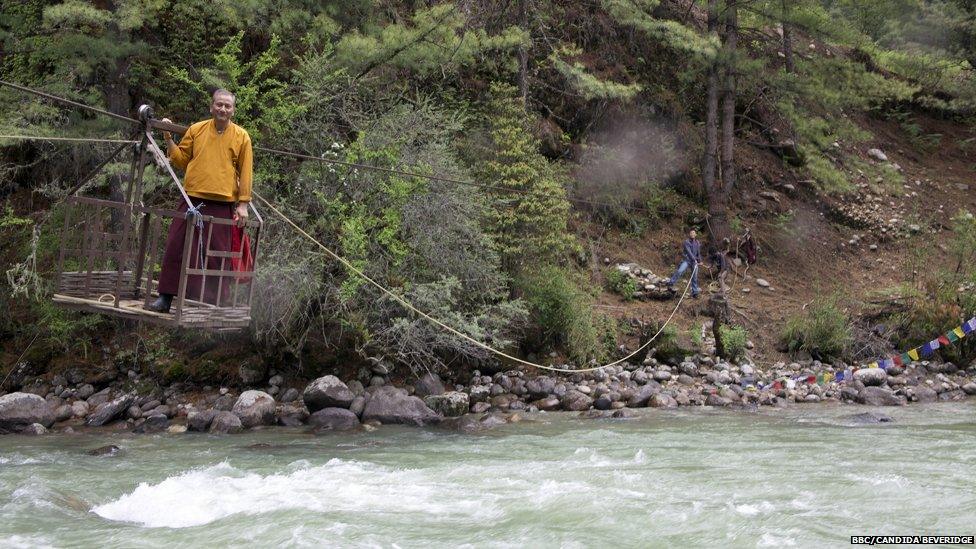
Despite his own share of personal grief, nowadays Chetri always has a smile on his face. He says he's a naturally happy person, but he never dreamt he would end up as the man responsible for Bhutan's happiness.
His rise up through the ranks started when, freshly out of college, he was called on by government to bring about the the king's wish to develop Bhutan's newly emerging private sector. Working for the royal family wasn't an easy task.
"For us, a king's wish is a command," he says. "You have to work very hard to meet their expectations." He would often work until 03:00, catch a few hours' sleep at home and be back at work promptly at 08:00.
If he made a mistake, he would be punished - on one occasion the king's aunt called him and said, "Saamdu, I'm coming with a stick. Stand on the roadside."
"If I got a scolding I would cry," says Chetri. "I always tried to be very straightforward, working as sincerely and loyally as I could, and if some blame came to me I felt always hurt - so I cried often."
After many years of working in the capital, he retired to his village in the south of Bhutan - he wanted to go back to living among nature, which he had loved as a boy. But it was not to be.
When Bhutan elected its first democratic government, he was summoned back to the capital, Thimphu, and asked to work for the cabinet office of Bhutan's first, freshly elected democratic government.
Five years later he was the man chosen to head up Bhutan's first Gross National Happiness Centre based in Thimpu.
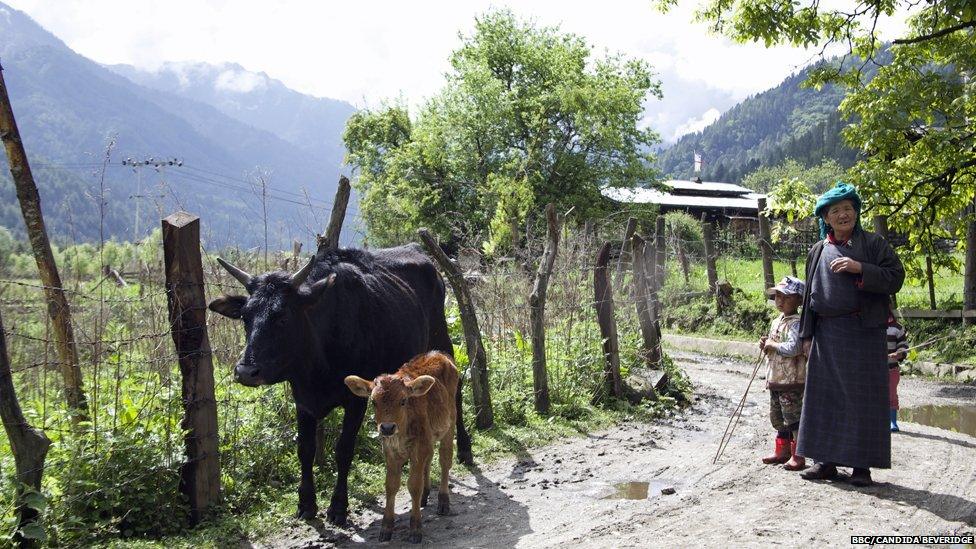
Despite the focus on national wellbeing, Bhutan faces huge challenges. It remains one of the poorest nations on the planet.
A quarter of its 800,000 people survive on less than $1.25 a day, and 30% live without electricity. It is struggling with a rise in mental illness and divorce.
Chetri explained how Bhutan's nationwide happiness surveys are used to improve people's lives.
"The research could come out and say: women between the ages of 30 and 55 are unhappy. The reasons could be because they have very little education, because they lose a lot of time collecting water from distant places, they have to collect firewood, and they have no education, no time for themselves."
The solutions might be to bring on formal education, pipe the water closer to their villages, and provide efficient cooking stoves.
Principles
Five years after it was first announced, Chetri is about to realise his dream of creating a centre in a beautiful natural setting where people from Bhutan and the rest of the world can come to learn how to lead happier lives.
Visitors to the GNH centre, finished this month but officially opening its doors to the public on 18 October, will learn three basic principles - to be part of nature, to serve others with kindness and compassion, and to discover their innate value.
Chetri starts every day meditating and it's compulsory for everyone in his office to start the day this way too. "I wish I did not need to do anything but just to sit here and meditate," he says.
"I would love that, but it's difficult to be looking after a centre where you have to do a lot of planning, a lot of administrative work. It irritates me a lot."
Saamdu Chetri appeared on Outlook on the BBC World Service. Listen again to the interview on iPlayer or get the Outlook podcast.
- Published2 August 2013
